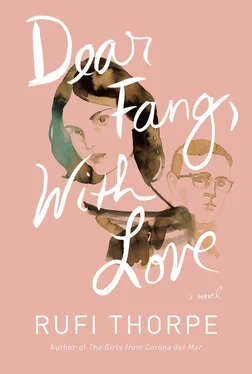Agata was much older than I had thought she would be. I’d been thinking of her as my mother’s age, but of course my mother had been born in the 1950s and Agata must have been born in 1943 or ’44, which explained why Herkus was older than me. She accepted my handshake, but then held her arms open and kissed me twice on the cheeks. She said something in Polish and Herkus translated, “She says she would give anything to meet your mother.”
“She would love to meet you, too,” I said, though I wasn’t sure if this was true. My mother’s sense of her history was like a beloved stage prop, a fan she used to hide coquettishly behind or a shawl that she posed with in lavish repose. I wasn’t sure how she would handle having it changed, suddenly having to contend with a sister, which is perhaps why I had avoided telling her about meeting Herkus in the first place. We were standing in the kitchen, which was just one corner of a large room decorated like a lodge with leather couches and wood paneling. The house was made of red-stained wood, a long simple rectangle with a pitched roof that had been done over in some ecological way so that grass was growing on it. I did not know if this was an old tradition or something very modern.
“She says,” Herkus translated again, “that she wants to call you son because you are her sister’s child. She says she loves you very much.”
Agata reached again for my face and kissed me full on the lips, then let her hands rest on my cheeks, just staring at me. She smoothed my eyebrows with her thumbs. She said something again in Polish, and her face was pink, her eyes misty.
“She says you and I are like twins,” Herkus said.
“I’m the big twin,” I said, and patted my belly.
“Hey, no,” Herkus said, “I am older than you. I would have been the big one. It would have been me dunking your head under water and pushing you off couches so you broke your arm.”
I laughed, imagining a childhood spent being beaten up by Herkus, here in the Lithuanian forest. Everywhere I looked, there were little blond children running around. A toddler was naked, his penis bobbing as he ran, and there was a girl who must have been about four in a fairy costume, sparkling wire-and-mesh wings strapped to her back. The party was huge, maybe thirty or forty adults and then an infinity of children.
Vera and I were introduced around and given kisses and emotional embraces by everyone, though I was uneasy because I could not keep track of their names and most of them began speaking to us in Polish or Lithuanian, not knowing or caring that we couldn’t understand. Sometimes Herkus translated, sometimes he just smiled and nodded, perhaps forgetting that we didn’t know what was being said. The party spilled out of the house and onto the deck and then all over the lawn. Beyond that were pine trees. Pop music was playing out of a gray boom box with hot pink trim that must have been from the ’80s, sitting on the railing of the deck. Justine was there, wearing a denim dress that made her seem like a different person entirely. No longer severe, no longer a scholar, she sat in the grass, legs splayed, and let a little boy sprinkle grass on her head.
Vera was having an easier time making conversation than I was because of her Russian, and so I found myself drifting toward the picnic table that was laid out with dish after dish of food. There was dark rye bread, little latkes and blini, a dish of orange caviar, a dish of sour cream, cabbage rolls, strawberries and blueberries and some other berry I couldn’t identify. Big platters of sliced tomatoes and onions and some kind of salami. It reminded me of parties I had been to at Katya’s parents’ house. I had been tentatively invited to these after reentering Vera’s life. Vera’s sixteenth birthday had been hosted at Inna and Pavel’s house, a smorgasbord of food and toasts. Russians loved toasts and even the men would go on, openly crying, making long speeches in Russian that I had to sit through comprehending only the simple verbs: “go,” “do,” “make.” That was all that was left of my high-school Russian: a vague sense of motion in a chaos of unknown nouns. The only thing I could still say in Russian was “I love you.” The only thing I knew how to say in Lithuanian was “hello.” And in Polish, I could say absolutely nothing. I loaded a plate and went back to wandering, smiling at whoever smiled at me.
Who were these people? My family? This was the kind of family and belonging I had always wanted. What my father had been so arch about, so unwilling to give, these people extended in a heartbeat, without thinking, as though it were all for free. “I call you son,” Agata had said. “We are family,” Herkus had said. But I still couldn’t carry on the simplest conversation with any of them. I was an alien, floating alone in my pod through their happiness.
I had never identified as either Polish or Lithuanian in the same way that Kat had identified as Russian. Even Vera felt herself to be more distinctly un-American than I ever had. If anything, I had felt disappointed at how easy assimilation had turned out to be, how quickly whatever strings of blood or fate connected me and Grandma Sylvia had been cut. Why was I then so bothered by the idea that Herkus might be the grandson of a Nazi, that Agata was staring out at me through loving, murderous eyes? Maybe it didn’t matter who our fathers were.
I didn’t figure out until it was time for the birthday cake that Vera had gotten it wrong: We weren’t celebrating some cousin’s birthday. It was Agata’s seventieth birthday and everyone had gathered to celebrate her. Suddenly the huge party, the endless children, made sense. This was their matriarch. This was their Grandma Sylvia. Her birthday marked the passage of time in their world.
I did the math rapidly in my head. Grandma Sylvia’s rape birthday had been January 18, 1943. If she had gotten pregnant on that day, she should have had the baby sometime in October. I did the math several more times to make sure. There was no way that Agata was the daughter of the SS officer, not if we were celebrating her birthday in July 2014, and not if she was turning seventy years old. Herkus’s grandfather had been the forest husband after all.
It had been a ridiculous thing to focus on, this idea of Herkus being the progeny of a Nazi rapist. And if I had been truly anxious about the possibility that Agata was a Nazi’s daughter, then finding out the truth should have brought me relief. But it didn’t. In fact, I felt more anxious than ever. I stood holding my paper plate in the bright sunshine, smiling vacantly.
Agata sat in a special chair garlanded with ribbons and flowers, and a girl, maybe a grandchild or niece, brought her a special pink sash to wear. Everyone sang a song that bore no relationship to “Happy Birthday” but was clearly the same thing, and I was happy to clap. For my mother’s birthdays, I just took her out to brunch. Our family consisted of only us two. Christmases were so lonely, we didn’t even bother anymore. Katya did not like Vera celebrating Christian holidays, so even when I reentered Vera’s life, our gatherings hadn’t really gotten any fuller. I wished my mother could be put on a garlanded chair and sung to by a bunch of happy, drunk people. I wished there were children running around for her to laugh at.
As the afternoon wore on, there was dancing and a lot of drinking and Vera danced with many boys. They were probably technically her second cousins, but no one seemed concerned about it. All in all, it was a success, and I did not even get drunk. Herkus, on the other hand, was a sloshy mess by the time he was loading Vera and me into our cab.
“I love you,” he said, and moaned. “Oh, it is terrible that you are leaving so soon. You must come back to Vilnius!” Indeed, the tour was almost over and our flight home was on Monday.
Читать дальше












